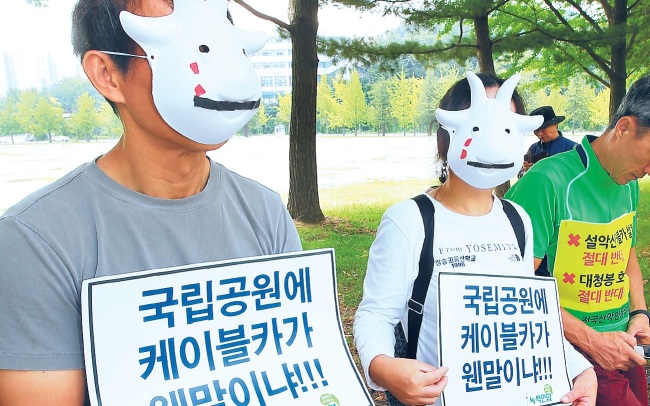The government’s decision to allow the construction of a second cable car route on Mount Seoraksan last week drew mixed reactions over the weekend, with civic groups blasting authorities for ignoring its potential environmental impact and local residents calling it a business opportunity.
The Environment Ministry’s national park committee on Friday agreed to allow Yangyang County Office of Gangwon Province to construct a 3.5-kilometer cable car on Mount Seoraksan, one of the country’s best-preserved national parks.
The cable car will start running from February 2018 when the PyeongChang Winter Olympics are held, officials said.
 |
| A group of environmentalists hold a rally against the government’s decision to allow the Mount Seoraksan cable car project at Gwacheon Government Complex, Gyeonggi Province, Friday. (Yonhap) |
The decision came after a long debate over the plan’s potential environmental impact and economic feasibility.
Yangyang residents and the county office argued that the cable car project will not only boost the local economy by bringing nearly 100 billion won ($85 million) of financial benefits, but also offer more diverse travel routes for mountain visitors, especially for the elderly and disabled, who often have difficulty accessing the national park.
Environmentalists, however, expressed ecological concerns, claiming that the proposed cable car route went through a natural habitat for various endangered species, especially a type of mountain goat, which is a grade I endangered species.
Acknowledging the civic group’s opposition, the national park committee ordered the county office to fulfill seven preconditions ahead of starting the project. This includes strengthening safety rules and measures to support endangered species, mapping out facility monitoring and donating to a forest protection fund.
Despite these preconditions, civic groups objected to the approval, arguing that the new proposed route would still affect the natural habitat of the mountain goats.
“The approval is not valid as there were some procedural problems,” said the environment groups, urging the environment minister and vice-minister to step down from their posts. They added that they would meet religious groups Monday to discuss how to take action against the government’s decision.
Environmentalists have expressed concerns that the government’s decision will motivate other cable car projects being pushed by other local governments.
As of now, only three cable car facilities exist in national parks, including the existing Seoraksan cable car, with the latest one constructed at Mount Deogyusan in 1996. Four cities and counties in other regions are currently gearing up to launch their own cable car projects in the national parks.
The cable car project on Mount Seoraksan was approved a year after President Park Geun-hye vowed to support the project, as part of the government’s efforts to boost the local economy ahead of the 2018 PyeongChang Winter Olympics.
“I hope that the cable car is pushed as early as possible, by the time the PyeongChang Winter Olympics are held (in 2018),” Park said.
The ministry previously rejected the cable car project proposal in 2012 and 2013, citing concerns over the animals’ natural habitats, and over the short distance between the mountain’s main peak and the cable car destination.
Under the legal criteria, the location of the destination must be far from the mountain’s peak in order to minimize access of cable car users to areas away from the usual hiking courses.
Experiencing two failures, the county changed the route to a location it says is far enough from the natural habitat and distant enough from the mountain peak.
By Lee Hyun-jeong (rene@heraldcorp.com)

